|
|
|
Sort Order |
|
|
|
Items / Page
|
|
|
|
|
|
|
| Srl | Item |
| 1 |
ID:
178924
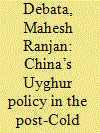

|
|
|
| 2 |
ID:
055132
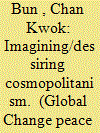

|
|
|
| 3 |
ID:
128510
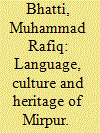

|
|
|
|
|
| Publication |
2013.
|
| Summary/Abstract |
Language, culture and heritage are the cornerstones of civilizations - ancient, medieval and present. It is very difficult to draw the lines of demarcation between languages, cultures and heritage of different regions
because these are interwoven and overlapping. Language is a medium of -expression of feelings, emotions, reason, prudence, passions and vision. Mankind since time irnmemorial has evolved different modes of expression, écalled tongues, dialects or languages. A language is a living organism, 'which originates, develops and dies. There are so many languages that have died away and are extinct now. l Culture re?ects the macro and micro behavioural structure of a society :generally accepted. All practices that people undertake, adopt or follow {consciously for their economic, social, political, moral, religious or spiritual
satisfaction come under the garb of culture. These practices, rites, rituals, =;customs, traditions, arts, architecture, food and dress etc. become part of . their individual and collective life and pass on from generation to -generation. It is a process of history and differentiates one community from other, one nation from other and one time span from the other. It is e a tree that has its roots in the past, branches in the present and shades future.
|
|
|
|
|
|
|
|
|
|
|
|
|
|
|
|
| 4 |
ID:
132735
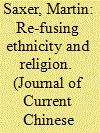

|
|
|
|
|
| Publication |
2014.
|
| Summary/Abstract |
The relation between ethnicity and religion has had a troubled history in the People's Republic of China. Conflating religious practice with ethnic culture is considered to carry the risk of breeding "splittism" - especially in Tibet and Xinjiang. While in the post-Mao era the outright hostility against religion has given way to a religious revival, keeping religion and (nationality) politics separate has remained a major concern for the Chinese Communist Party. Religion is supposed to be a private matter that does not interfere with pol-itics. Against this backdrop, a recent phenomenon in the Tibet Autonomous Region is all the more remarkable: the (re-)fusion of ethnicity and religion under the label of cultural heritage and its protection. This paper approaches this officially endorsed re-fusion ethno-graphically and examines its wider implications. I argue that endorsing religion as an attribute of Tibetan heritage corresponds to the concept of defining public spaces and events in which religious practice is legitimate and expected. Simultaneously, religious practices outside these dedicated spaces and events become even more problematic, leading to everyday Buddhist practices, such as circumambulation, being seen as (and performed as) political acts.
|
|
|
|
|
|
|
|
|
|
|
|
|
|
|
|
| 5 |
ID:
132310
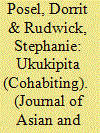

|
|
|
|
|
| Publication |
2014.
|
| Summary/Abstract |
In South Africa non-marital cohabitation rates among Africans remain low, and particularly in the context of very low marriage rates. Through qualitative interviews with urban isiZulu-speakers we explore attitudes towards ukukipita (cohabiting) in contemporary Zulu society. These in-depth interviews capture the meanings associated with non-marital cohabitation and they provide insights into why cohabitation is widely viewed as unacceptable in Zulu society unless the man has initiated ilobolo (bridewealth) negotiations and concrete marriage plans are in place. Cohabitation without ilobolo payment is widely interpreted as akin to behaving disrespectfully towards Zulu culture and tradition, the immediate family and the Zulu community more broadly.
|
|
|
|
|
|
|
|
|
|
|
|
|
|
|
|
|
|
|
|
|